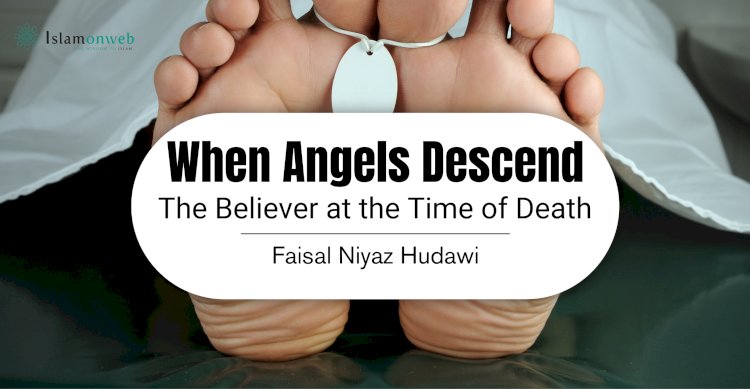When Angels Descend: The Believer at the Time of Death
When I was a young student at Darul Huda, still in my teens, I received a phone call that would stay with me for the rest of my life. It was during exam days when I was informed that my grandfather was very ill, hospitalized, and wanted to see me. Getting permission wasn’t easy, but somehow it was granted. I packed my small bag and boarded a train from Parappanangadi, a small station in Malappuram, to Kollam, my hometown, a journey that took nearly eight hours. I was unaware that this trip would teach me one of the most profound lessons of faith.
When I reached the hospital, my grandfather was in his final days. His voice faded in and out between moments of consciousness and silence. Sometimes, he would speak softly, giving gentle instructions to his children and wife, sharing his last pieces of advice. He even divided whatever little he had left in his pockets.
That night, when he heard that I had arrived, his face brightened. He looked at me and said words that I still carry in my heart:
“Nothing to worry, son. There’s no Shayṭān here; Only angels and the souls of believers.”
The very next morning, at the time of Fajr, his soul peacefully departed.
Since that day, whenever I recite the words of Allah ﷻ,
إِنَّ الَّذِينَ قَالُوا رَبُّنَا اللَّهُ ثُمَّ اسْتَقَامُوا تَتَنَزَّلُ عَلَيْهِمُ الْمَلَائِكَةُ أَلَّا تَخَافُوا وَلَا تَحْزَنُوا وَأَبْشِرُوا بِالْجَنَّةِ الَّتِي كُنْتُمْ تُوعَدُونَ
“Indeed, those who say, ‘Our Lord is Allah,’ and then remain steadfast — the angels descend upon them, [saying], ‘Do not fear and do not grieve, but receive good tidings of Paradise which you were promised.’” (Fussilat 41:30)
I remember that moment. The calmness on his face, the serenity that filled the room, and those words about angels. That verse has since become one of my favourites, a verse that reminds me how believers are not alone at the time of death; they are gently received by the angels of mercy, returning to their Lord in peace.
The state of a believer at the time of death is profoundly different from that of a disbeliever. The believer does not endure the agony or dread that overwhelms the disbeliever; rather, he experiences peace, reassurance, and divine mercy.
Just before the final moment, angels descend upon him, comforting and gladdening his heart. The angels calm his fears and soothe his heart, assuring him of the Paradise he has long awaited. Many righteous people have been seen smiling at their final breath, their faces radiating serenity, as though beholding the unseen beauty they were promised.
Mujāhid said, as recorded by al-Ṭabarī: “Do not fear what you are about to face in the Hereafter, nor grieve over your family or the world you leave behind — for we shall take care of all that you entrust to us.”
When the cause of death — be it illness, fire, drowning, or any other form — approaches the believer, Allah envelops him in mercy. The angels descend to greet him with peace, and the Angel of Death hastens to extract his soul gently, sparing him pain. His soul flows out smoothly, “as a drop flows from the mouth of a waterskin.”
Al-Barā’ ibn ʿĀzib narrated that the Prophet ﷺ said:
“When the believing servant is about to depart this world and enter the Hereafter, angels with bright faces — as if their faces were the sun — descend from heaven with a shroud and perfume from Paradise. They sit within sight of him as far as the eye can see. Then the Angel of Death comes and sits at his head and says, ‘O good soul, come out to Allah’s forgiveness and pleasure.’ The soul comes out smoothly, like a drop from the mouth of a waterskin. The Angel takes it, and no sooner does he grasp it than the other angels take it and wrap it in the shroud and perfume it. From it comes a fragrance like the finest musk on earth. They ascend with it, and whenever they pass a company of angels, they ask, ‘What is this good soul?’ They reply, ‘It is so-and-so, son of so-and-so,’ using the best names he was known by on earth. They bring it to the lowest heaven, and the gates are opened for it… until it reaches the seventh heaven. Allah then says, ‘Record the book of My servant in ʿIlliyyīn and return him to the earth, for from it I created them, into it I shall return them, and from it I shall bring them forth once again.’”
(Reported by Aḥmad and Abū Dāwūd)
The Qur’an and Sunnah make clear that the soul of a believer departs with tranquillity, full of trust and comfort, unlike the disbeliever’s soul, which resists and is torn violently from the body. Allah ﷻ says:
الَّذِينَ تَتَوَفَّاهُمُ الْمَلَائِكَةُ طَيِّبِينَ يَقُولُونَ سَلَامٌ عَلَيْكُمُ ادْخُلُوا الْجَنَّةَ بِمَا كُنْتُمْ تَعْمَلُونَ
“Those whose souls the angels take in a state of purity, saying to them, ‘Peace be upon you. Enter Paradise for what you used to do.’” (Al-Naḥl 16:32)
And again:
يَا أَيَّتُهَا النَّفْسُ الْمُطْمَئِنَّةُ * ارْجِعِي إِلَى رَبِّكِ رَاضِيَةً مَرْضِيَّةً * فَادْخُلِي فِي عِبَادِي * وَادْخُلِي جَنَّتِي
“O tranquil soul, return to your Lord, well-pleased and pleasing [to Him]. So enter among My servants and enter My Paradise.” (Al-Fajr 89:27–30)
Before his soul departs, the angels descend with glad tidings of forgiveness and divine pleasure. Then Allah ﷻ eases the moment of death for him, and the angels swiftly take his soul, perfume it, and ascend joyfully towards the heavens.
Another ḥadīth beautifully illustrates how the soul of a believer is received with honour, peace, and joy by the angels and by the righteous souls that preceded him.
Abū Hurayrah رضي الله عنه narrated that the Prophet ﷺ said:
“When the believer’s death approaches, the angels of mercy come to him with a white silk cloth and say: ‘Come out, content and pleasing to Allah, to the mercy of Allah, to fragrance and sustenance, and to a Lord who is not angry with you.’ Then his soul departs with the sweetest scent of musk. The angels pass it hand to hand, saying to one another, ‘How pleasant is this fragrance that has come from the earth!’ They then bring it to the souls of the believers, who rejoice more at his coming than any of you would rejoice at the arrival of a long-absent loved one…” (Narrated by al-Nasā’ī (1833) Ibn Ḥibbān (3014), and al-Ḥākim (1302). Authenticated by Ibn Ḥibbān)
Death is Relief for a believer
Abū Qatādah رضي الله عنه reported:
“We were with the Messenger of Allah ﷺ one day when a funeral passed by him. The Prophet ﷺ said: ‘[He is] either one relieved or one from whom others are relieved.’
The companions asked, ‘O Messenger of Allah, what do you mean by “one relieved” and “one from whom others are relieved”?’
The Prophet ﷺ replied: ‘The righteous servant finds relief from the hardships and burdens of this world to the mercy of Allah, while the wicked servant brings relief to people, the land, the trees, and the animals from his evil.’”
(Narrated by al-Bukhārī 6513, Muslim 950, Aḥmad 22592, al-Nasāʾī 4/48, Ibn Ḥibbān 3007)
This ḥadīth, awakens the heedless heart to the reality of death, a truth that spares no one, and reminds every soul of its inevitable return to its Creator.
The message of the ḥadīth is clear: people, when they die, fall into two distinct categories.
The first is the righteous believer, pure in faith and steadfast in worship, whose heart remained attached to Allah throughout his life. Such a person never found comfort in the fleeting luxuries of this world, nor was he deluded by its temporary pleasures. His heart was alive with love for Allah, filled with longing for His closeness, and content with His decree. He awaited that moment of meeting, yearning to behold the Divine Face, to attain His mercy and reward, and to enter the eternal abode of peace.
For such a believer, death is not destruction; it is deliverance. It is as though he had been a prisoner whose bonds had finally been loosened, or a bird freed from its cage. The soul that once struggled in this narrow world now flies toward infinite horizons, welcomed by the words:
“O tranquil soul, return to your Lord, well-pleased and pleasing [to Him]. So enter among My servants and enter My Paradise.” (Al-Fajr 89:27–30)
Allah Loves to Meet You
Al-Bukhārī narrates from ʿUbādah ibn al-Ṣāmit that the Prophet ﷺ said:
“Whoever loves to meet Allah, Allah loves to meet him; and whoever dislikes meeting Allah, Allah dislikes meeting him.”
ʿĀʾishah رضي الله عنها said:
“O Messenger of Allah, we all dislike death.”
He ﷺ replied:
“That is not what I mean. The believer, when death comes to him, is given the glad tidings of Allah’s pleasure and honour, and nothing becomes dearer to him than what lies ahead. Thus, he loves to meet Allah, and Allah loves to meet him. As for the disbeliever, when death comes to him, he is given the tidings of Allah’s punishment and wrath, and nothing becomes more hateful to him than what lies ahead. Thus, he dislikes meeting Allah, and Allah dislikes meeting him.”
(Al-Bukhārī and Muslim)
Explaining the above hadith, Abū al-ʿAbbās al-Qurṭubī رحمه الله said:
“This dislike of death is a natural aversion, it arises from the soul’s instinctive recoil from pain and harm, and its difficulty in accepting them. Undoubtedly, this feeling is found in everyone. However, for the one whom Allah blesses with a taste of His love or unveils to him something of the beauty of His Divine Presence, that natural fear is overcome by the sweetness of pure love. Thus, when his departure approaches, he welcomes death and its throes as one greets a beloved guest. As Muʿādh ibn Jabal رضي الله عنه said at the time of his death: ‘Welcome, dear one who comes at a time of need! Woe to him who regrets this day!’ And during the throes of death, he would say: ‘Strangle me as you wish! By Your might, my heart truly loves you!’” (Al-Mufhim limā Ashkala min Talkhīṣ Kitāb Muslim, vol. 3, p. 644)
Al-Mazharī رحمه الله commented on this hadith:
“The Prophet’s ﷺ words — ‘It is not as you think, O ʿĀʾishah’ mean that the dislike of death she referred to is not what was intended. Believers may dislike death in health or sickness, before the Angel of Death arrives, due to fear of its pain, not out of aversion to leaving this world for the Hereafter. But when the believer actually sees the Angel of Death and is given glad tidings of the rank and honour prepared for him by Allah, all fear vanishes, and he yearns for his soul to be taken quickly so that he may hasten to the mercy awaiting him. As for the disbeliever, his state is the complete opposite.” (Al-Mafātīḥ fī Sharḥ al-Maṣābīḥ, vol. 2, p. 414)
Ibn Rajab رحمه الله likewise said:
“When death comes to the believer who has prepared for it, he thinks well of his Lord. The glad tidings from Allah reach him, so he loves to meet Allah — and Allah loves to meet him. The sinner, on the other hand, meets the opposite. At that moment, the believer rejoices and finds comfort in what lies ahead, in the fruits of his deeds and the mercy promised to him. But the negligent one is struck with regret and says:
‘Alas for me for having neglected my duty to Allah!’ (Al-Zumar 39:56)” (Jāmiʿ al-ʿUlūm wa al-Ḥikam, vol. 1, p. 476)
Imām Aḥmad also narrated in his Musnad from ʿAṭāʾ ibn al-Sāʾib that he once saw ʿAbd al-Raḥmān ibn Abī Laylā, an elderly man with white hair and beard, following a funeral. He heard him saying:
“So-and-so narrated to me that he heard the Messenger of Allah ﷺ say: ‘Whoever loves to meet Allah, Allah loves to meet him; and whoever dislikes meeting Allah, Allah dislikes meeting him.’”
Hearing this, the people wept. Ibn Abī Laylā asked, “Why are you crying?”
They replied, “We dislike death.”
He said:
“That is not the meaning. When death approaches, Allah says: {فأما إن كان من المقربين فروح وريحان وجنة نعيم} {So as for one who is brought near [to Allah], there is comfort and fragrance and a garden of bliss} (Al-Wāqiʿah 56:88–89). When the believer is given this glad news, he loves to meet Allah, and Allah loves to meet him. But if it is said:{وأما إن كان من المكذبين الضالين فنزل من حميم} {But if he is one of the deniers who went astray, then for him is accommodation of scalding water and burning in Hellfire} (Al-Wāqiʿah 56:92–94), then he detests meeting Allah, and Allah detests meeting him.”
Al-Bukhārī also narrated from Anas رضي الله عنه:
“When the Prophet ﷺ became gravely ill, and the pangs of death overcame him, Fāṭimah رضي الله عنها cried, ‘O the distress of my father!’ The Prophet ﷺ said, ‘Your father will suffer no more distress after today.’
And Ibn Abī al-Dunyā narrates in al-Muḥtadarīn that Saʿīd ibn ʿAbd al-ʿAzīz said:
“When Bilāl رضي الله عنه was on his deathbed, His wife cried, ‘What a calamity!’ but he responded, ‘What a joy!’” and he added: ‘Tomorrow we shall meet the beloved ones, Muḥammad and his companions!’
These reflections beautifully harmonise with the Prophet’s ﷺ teaching that loving to meet Allah is not about seeking death itself, but about yearning for what follows, the divine encounter, the forgiveness, and the eternal rest prepared for the righteous.
Thus, the believer’s natural unease before death is soon replaced by longing when the veils lift and he beholds the angels, the fragrance of Paradise, and the nearness of the Lord he had loved all along.
At that moment, becomes the long-awaited reunion between the lover and the Beloved.
Indeed, we belong to Allah, and to Him we shall return.
Disclaimer
The views expressed in this article are the author’s own and do not necessarily mirror Islamonweb’s editorial stance.
























Leave A Comment